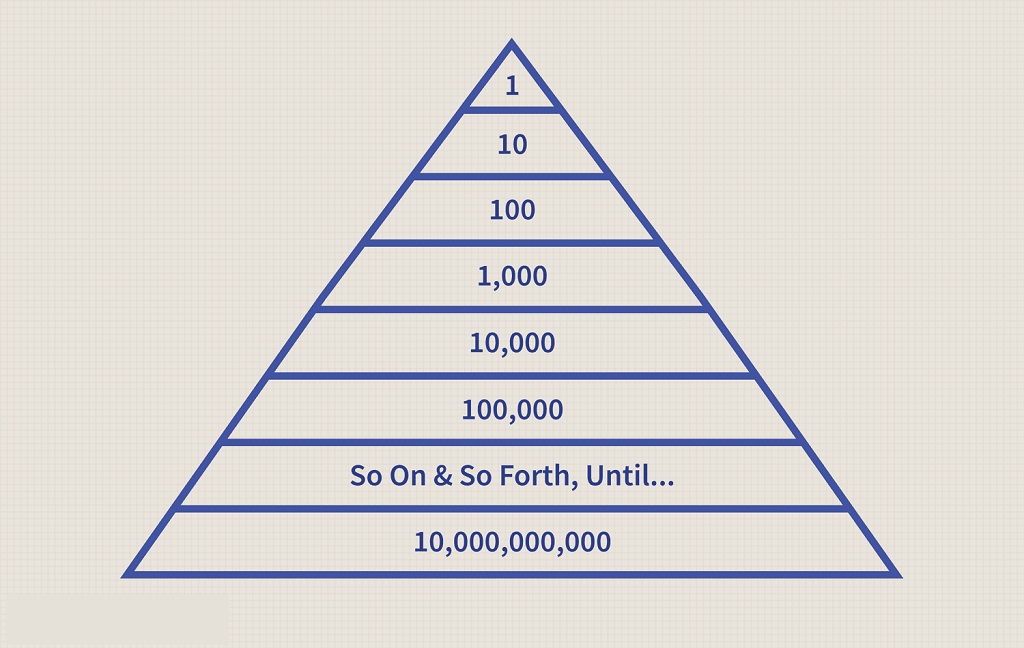
05 Feb What is a Pyramid Scheme: Uncovering the Truth
A pyramid scheme is a fraudulent business structure that recruits members through a hierarchical recruitment system, primarily focusing on monetary gains from recruits rather than actual product sales. In today’s world, where financial opportunities are sought after, it is essential to understand the underlying risks associated with pyramid schemes.
These schemes often promise huge returns on investment but rely on a constant influx of recruits to sustain the structure. While they may initially seem like legitimate business ventures, pyramid schemes lack a sustainable business model, leading to financial loss for most participants. Awareness of the red flags and warning signs is crucial to prevent falling prey to these deceptive practices. We will delve deeper into the mechanics of pyramid schemes, how to identify them, and their legal consequences. For additional resources and discussions on this topic, the link feel blog can be a valuable source of information, providing further insights into recognizing and avoiding such fraudulent schemes.
The Basics Of Pyramid Schemes

In this blog post, we will delve into the world of pyramid schemes, uncovering their origins, definitions, and key characteristics. Understanding the basics of pyramid schemes is essential to protect yourself from falling victim to them. Let’s begin by exploring the origins and definition of these deceptive practices.
Origins And Definition
Pyramid schemes have been lurking in various forms for many years, deceiving individuals with promises of easy riches. The term “pyramid scheme” was coined due to the deceptive structure resembling the shape of a pyramid. These schemes operate by recruiting members who pay a fee to join and then earn money by recruiting additional members. Unfortunately, the reality is that the profits primarily come from recruiting new participants rather than from legitimate business activities or the sale of products/services. This method of operation draws comparisons to the discussions surrounding different business models, such as the inquiry is AlphaSights a consulting firm, where the core operations and legitimacy are scrutinized.
Key Characteristics
Pyramid schemes share several key characteristics that can help you identify and avoid them:
- Hierarchical Structure: Pyramid schemes are hierarchical, with a small group of individuals at the top who profit the most. As the scheme grows, more participants are recruited, forming tiers or levels beneath the initial members.
- Recruitment-Oriented: The main focus of pyramid schemes is to recruit new members, often incentivizing active participants to bring in more individuals. This recruitment-driven nature heavily emphasizes expanding the pyramid rather than selling genuine products or services.
- High Earnings Promises: Pyramid schemes tend to make extravagant claims about potential earnings, with promises of quick wealth and financial independence. They often showcase a few success stories to lure in unsuspecting individuals.
- Lack of Tangible Products: Unlike legitimate multi-level marketing (MLM) companies that distribute tangible products or services, pyramid schemes typically lack substantial products or involve selling low-quality items that offer minimal value.
- Unsustainable Structure: Pyramid schemes are inherently unstable and eventually collapse due to their reliance on constant recruitment. The limited number of potential recruits and the inability to sustain the exponential growth required for longevity ultimately led to financial losses for most participants.
It is crucial to be aware of these key characteristics and remain skeptical of enticing offers that appear too good to be true. Pyramid schemes can have devastating financial consequences, so educating yourself and others about these deceptive practices is important.
Identifying Pyramid Schemes
Red Flags To Look For
When it comes to identifying pyramid schemes, there are key red flags to keep an eye out for. Recognizing these warning signs can help you avoid falling into the trap of a fraudulent money-making scheme. Here are some red flags to look for:
- The promise of high returns with little effort: One of the biggest red flags is when a scheme promises you high financial returns for minimal effort or investment. Remember, legitimate business opportunities usually require hard work and effort to succeed.
- Recruitment-focused: Pyramid schemes often heavily emphasize recruitment. If the main focus seems to be on recruiting new members rather than selling actual products or services, it’s likely a pyramid scheme.
- Complex compensation plans: Pyramid schemes typically have convoluted compensation structures that are difficult to understand. If the compensation plan seems overly complex and relies heavily on recruiting others, it’s a major red flag.
- Pressure to recruit: If you feel pressured to recruit others into the scheme, it’s a clear indicator of a pyramid scheme. Legitimate businesses don’t force or pressure their participants to recruit more people.
- Lack of genuine product or service: Pyramid schemes often downplay or have no genuine product or service to offer. Instead, the focus is on recruiting new members and collecting their fees. Legitimate businesses always have a tangible product or service at the core of their operations.
- Excessive emphasis on upfront payments or investments: Pyramid schemes typically require large upfront payments or investments to join, with promises of enormous returns. Be cautious if the focus is primarily on getting you to spend money rather than providing a valuable product or service.
Comparison With Legitimate Business Models
It’s important to understand the differences between pyramid schemes and legitimate business models. While pyramid schemes are unsustainable and illegal, legitimate businesses operate within the boundaries of the law and offer real value to their customers. Here are some key distinctions:
| Pyramid Schemes | Legitimate Business Models |
| Focus on recruitment, not product sales | Emphasize product sales or services |
| Compensation based on recruitment | Compensation based on product sales |
| Complex compensation plans | Transparent and easy-to-understand compensation structures |
| Promises of quick and high financial returns | Realistic income potential with effort and hard work |
| Reliance on upfront payments from recruits | Focus on providing value through products or services |
By familiarizing yourself with these red flags and comparing pyramid schemes with legitimate business models, you can better safeguard yourself from being ensnared in a deceptive scheme. Always remember that if something seems too good to be true, it probably is!
The Impact Of Pyramid Schemes
Pyramid schemes have far-reaching consequences, affecting individuals financially and socially. Unraveling the intricate web of deceit and exploitation reveals the detrimental effects on victims and communities.
Financial And Social Consequences
The financial fallout from participating in pyramid schemes can be devastating. Victims often suffer significant monetary losses, as they invest in a system destined to collapse. The lure of quick and substantial profits clouds judgment, leading to financial ruin for many.
Moreover, the social impact cannot be overlooked. Trust among friends, family, and community members can be shattered as individuals unwittingly draw others into the scheme. Relationships may be irreparably damaged, as the pursuit of profit takes precedence over ethical considerations.
Case Studies
Real-life examples shed light on the dire effects of pyramid schemes. Consider the case of [Company X], where numerous individuals invested their hard-earned money in hopes of substantial returns. However, when the scheme collapsed, livelihoods were destroyed, leaving a trail of financial despair.
Regulations And Legal Actions
Uncover what qualifies as a pyramid scheme and the legal implications involved. A pyramid scheme is an illicit business model that relies on recruiting others into the scheme rather than genuine product sales. These deceptive practices are subject to severe legal actions and penalties to protect consumers from financial harm.
To protect individuals from falling victim to pyramid schemes, governments around the world have taken various measures to regulate and curb these fraudulent activities. Furthermore, there have been notable legal cases where authorities have taken action against those running pyramid schemes. Let’s take a closer look at the government measures and some of the memorable legal cases that have shed light on the deceptive nature of pyramid schemes.
Government Measures
To combat pyramid schemes, governments have implemented strict regulations to deter their growth and protect potential victims. These measures include:
- Licensing requirements for multi-level marketing (MLM) companies to ensure compliance with legal standards.
- Compulsory disclosure of the MLM business’s compensation plan, allowing potential participants to make informed decisions.
- Establishment of government organizations and agencies to investigate, monitor, and take legal action against pyramid schemes.
- Collaboration with financial institutions to freeze the assets of pyramid scheme operators and recover funds to compensate victims.
- Regular inspections and audits of MLM companies to ensure compliance with regulations.
Notable Legal Cases
Over the years, there have been several high-profile legal cases that have exposed pyramid schemes and brought their operators to justice. Some of the most significant cases include:
| Case | Outcome |
| Company X vs. Scam Artist A | Scam Artist A sentenced to 10 years in prison and ordered to pay millions in restitution to victims. |
| Company Y vs. Fraudster B | Fraudster B was found guilty of operating a pyramid scheme and fined heavily. |
| Company Z vs. Con Artist C | Con Artist C’s assets were seized and distributed among the defrauded victims, while C faces multiple years of imprisonment. |
These cases serve as a reminder that pyramid schemes can have serious legal consequences for those involved. Authorities are committed to dismantling these frauds and ensuring justice for the victims. By implementing stringent regulations and carrying out legal actions against pyramid schemes, governments aim to protect individuals from falling prey to fraudulent schemes that promise quick and easy wealth. These measures act as a deterrent and help maintain the integrity of legitimate MLM businesses. Knowing that there are strict legal repercussions can dissuade potential perpetrators and safeguard consumers from being deceived by pyramid schemes.
Protecting Yourself From Pyramid Schemes

Pyramid schemes can be cunningly designed to trick people into parting with their hard-earned money, promising easy riches and financial success. Protecting yourself from these fraudulent schemes requires vigilance and awareness. By educating yourself and following certain tips for avoidance, you can safeguard your finances and avoid falling victim to pyramid schemes.
Educational Resources
An important step in protecting yourself from pyramid schemes is to educate yourself about their nature and tactics. By familiarizing yourself with the warning signs and common characteristics of pyramid schemes, you can better recognize and avoid them. Here are some educational resources that can help you:
- Attend seminars and webinars conducted by reputable financial institutions or consumer protection organizations. These sessions often provide valuable insights into recognizing and avoiding pyramid schemes.
- Read books and online articles written by experts in the field of finance and consumer protection. Look for reliable sources that provide comprehensive information on pyramid schemes and their red flags.
- Follow authoritative websites and blogs that regularly publish content related to scams and fraudulent schemes. These sources often share real-life examples and provide actionable advice to protect yourself.
Tips For Avoidance
Preventing pyramid scheme involvement requires a proactive approach. Stay one step ahead of fraudsters with these useful tips:
- Research the company and its business model: Before investing or participating in any financial opportunity, thoroughly investigate the company and its business model. Look for verifiable information about its products or services and the income potential.
- Beware of exaggerated income claims: Pyramid schemes often entice potential victims with promises of high and quick returns on their investments. Be skeptical of any income claims that seem too good to be true or lack a reasonable explanation.
- Understand the difference between multi-level marketing (MLM) and pyramid schemes: MLM is a legitimate business model, while pyramid schemes are illegal. Educate yourself about the distinguishing characteristics of both to avoid confusion and identify pyramid schemes.
- Avoid high-pressure sales tactics: Pyramid schemes typically employ aggressive sales tactics to pressure individuals into joining. Be wary of anyone who insists on a quick decision or encourages you to recruit others without thorough consideration.
- Consult with a financial professional: If you are unsure about an investment opportunity or suspect it may be a pyramid scheme, seek advice from a trusted financial advisor. They can offer an unbiased perspective and help you make informed decisions.
By staying informed, and vigilant, and following these tips, you can significantly reduce the risk of becoming a victim of a pyramid scheme. Remember, protecting yourself starts with knowledge and a healthy skepticism toward get-rich-quick schemes.
Frequently Asked Questions Of What Is A Pyramid Scheme
What Is A Pyramid Scheme?
A pyramid scheme is an illegal business model that promises participants high returns for recruiting others into the scheme. However, the primary way to make money is by bringing in new members rather than selling a legitimate product or service.
Eventually, the scheme collapses as it becomes unsustainable.
How Can I Identify A Pyramid Scheme?
You can identify a pyramid scheme by looking for red flags such as emphasis on recruitment, lack of a genuine product or service, and focusing on earning money solely through recruitment rather than product sales. Additionally, be cautious if the scheme guarantees high returns with little effort or requires large upfront investments.
Are All Mlm Companies Pyramid Schemes?
Not all MLM companies are pyramid schemes. While both MLM and pyramid schemes involve recruiting distributors, MLM companies focus on selling products or services. In contrast, pyramid schemes primarily rely on recruitment to generate revenue. MLM companies typically have legitimate products or services that distributors can sell to earn income.
How Can Pyramid Schemes Harm People?
Pyramid schemes can harm people by causing financial loss and emotional distress. Participants at the lower levels of the pyramid often lose their investments when the scheme collapses, while those who joined early may profit at the expense of later recruits.
Additionally, pyramid schemes can damage personal relationships and reputations as participants recruit friends and family into the scheme.
Conclusion
To wrap up, understanding the red flags of a pyramid scheme is essential for safeguarding your finances. Recognizing the deceptive tactics and focusing on legitimate opportunities empower you to make informed decisions. By staying informed and vigilant, Understanding the distinction between MLM and a pyramid scheme is crucial in safeguarding yourself and others from falling victim to these fraudulent schemes; while MLMs involve the sale of legitimate products or services with a focus on recruitment, pyramid schemes primarily rely on recruiting participants without any genuine product or service, making it essential to be discerning in your involvement.

Sorry, the comment form is closed at this time.